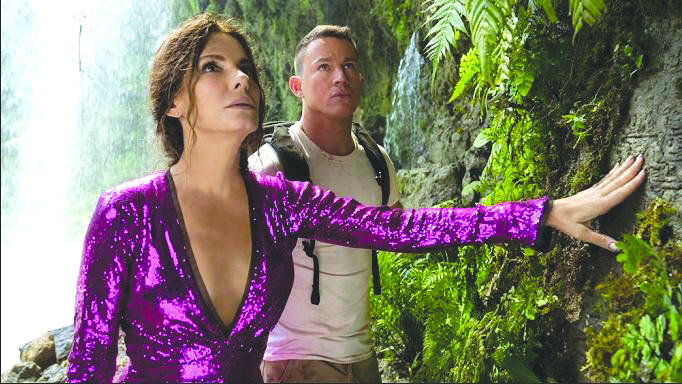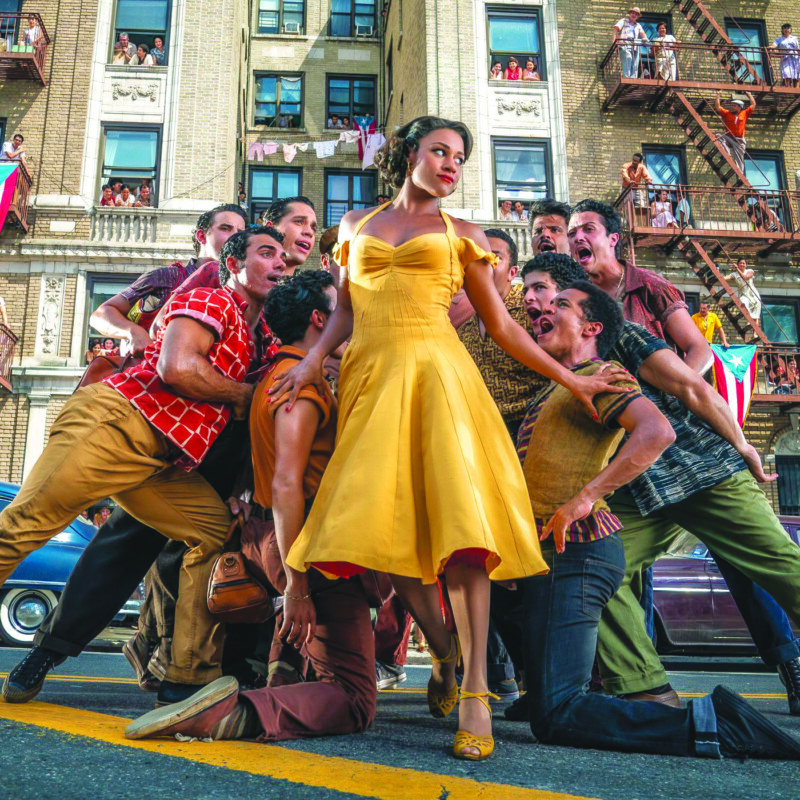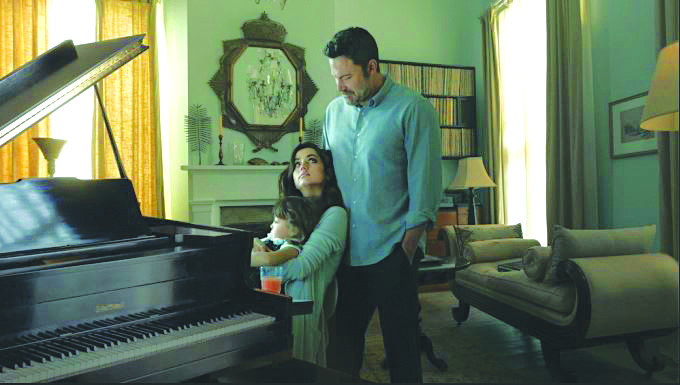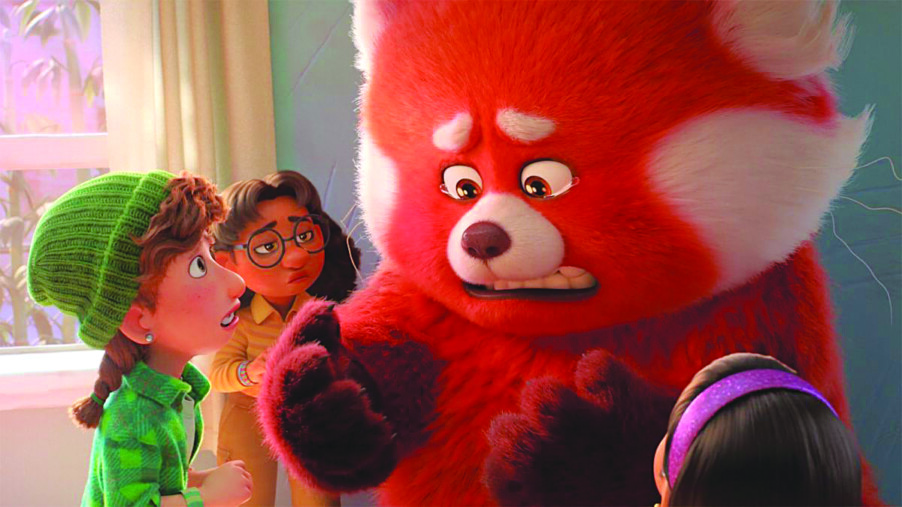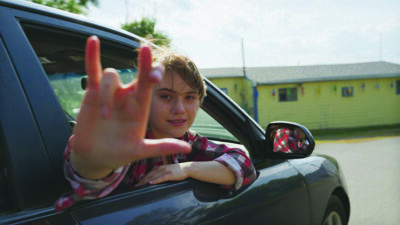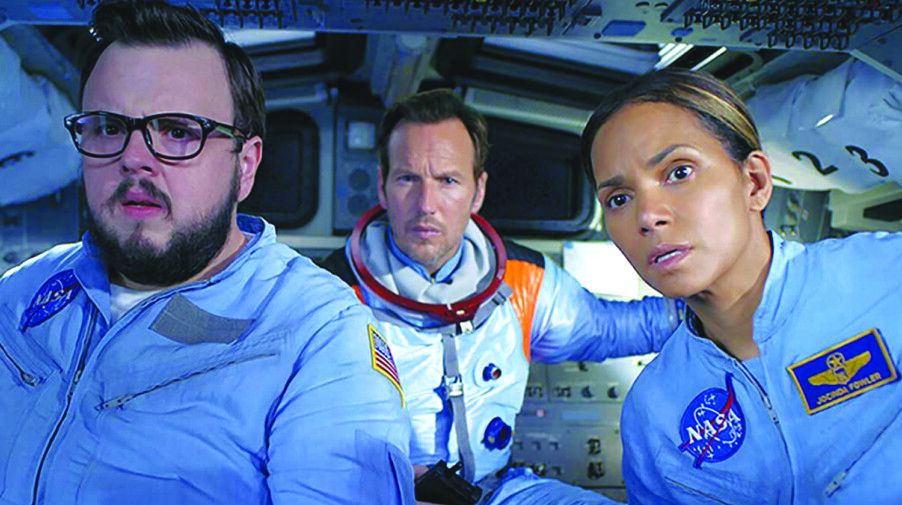Deep Water (R)
Ben Affleck and Ana de Armas chew all the scenery and bring all the ham as a sexy couple in the uproarious comedy Deep Water.
Or.
Beautiful people Ben Affleck and Ana de Armas play a couple whose relationship is as much ruled by tormenting each other as it is by desire in Deep Water, an intense and sexy thriller with a twisted sense of humor.
I feel like I’m supposed to feel the latter but for me it’s all the former. This movie was frequently “what? HA!” when I think it was supposed to be “ooo, twist!”
Married couple Vic (Affleck) and Melinda (de Armas) have some kind of kink that seems to involve her openly dating handsome young dudes and him menacing and maybe killing them. Which feels like an unsustainable situation, both as couple foreplay and as a serial killer pattern. Especially since they seem well-known in their town and always going to parties where members of their friend-group ask Vic why he’s letting Melinda flirt with these dudes right there, at the parties, in front of everyone. “It’s our sexy arrangement” would actually be a great answer and would make sure that they always get invited to parties because people love to be bystanders to drama. But instead, he sidesteps these discussions and only intervenes when Melinda’s drinking puts her or a host’s furniture in peril.
His odd calm, tendency to brood at his wife from afar and his hobby of raising snails would, in any normal circumstance, make him an obvious suspect when one of her boyfriends goes missing. But when Vic tells Joel (Brendan Miller), Melinda’s latest fling, that he murdered the previous guy and Joel apparently goes and tells, like, Everybody, all of Vic’s friends laugh it off. Buddies Jonas (Dash Mihok) and Grant (Lil Rel Howery) seem to think if anything Vic needs to show more of a reaction to rein in Melinda’s behavior.
But Vic doesn’t need or want to control Melinda, he claims. And Melinda seems to need the drama of these romances to make her life exciting. Perhaps this is what happens when, like Vic, you basically don’t need to work because you’ve retired very early and very wealthy from making computer chips. Specifically, the computer chips that help guide military drones, which means that even if Vic hasn’t actually offed any of his wife’s special friends, some people think of him as someone who has killed people. “Some people” include Don (Tracy Letts), the writer who smells both guilt and a story in Vic’s whole situation and who has newly become friends with Vic’s crew.
So I guess you could spend time wondering how much of this movie’s comedy is intentional, how much of the melodramatic acting of Affleck and de Armas is part of what the movie is doing to build atmosphere, how much of the score is supposed to send us to a Lifetime-esque Deadly Sexy: The Melinda Story-type place. Or, you could just go with it and “blah-ha!” at Melinda’s inappropriate behavior while Vic is trying to pay the babysitter (the couple has a 6-year-old daughter). Or at Vic’s whole deal with his snails — he has a Whole Lot of snails, it would definitely be one of the first things you would mention if you were describing him to someone: “he’s super rich, he has this bonkers wife and he has a thing about snails.”
Is this movie sexy? I’m not sure, the intentional sexiness is also kind of funny at times. And other than that this state of constant angst is just sort of their thing, the movie never gives a reason that this couple would stay together. I feel like there’s a Gone-Girl-ish destructive-people-who-are-addicted-to-each-other thing this movie is trying to build but it’s so much trashier and more ridiculous that it doesn’t elevate them from “movie characters” to “human-like.” But again, I think you just need to set logic, even the internal logic of this relationship aside, and enjoy the goofy ride. I do think a movie this soapy probably should have been as liberal with dude nudity as it is with de Armas’ toplessness. Also the elements about Vic’s concerns with Melinda’s drinking feel sort of like an unnecessary misdirection. This movie is at its best when its characters are being over-the-top bonkers.
Does this all mean you should skip Deep Water? No, but I think you need to choose the appropriate movie viewing situation. This is not the movie for when you want an actual thriller or a mystery of any kind or a romance. This is a movie for when you have a big bowl of popcorn and want to laugh about the nonsense you’re watching with someone who has an equal appreciation for what I think could arguably be described as camp. I think that makes it a C+?
Rate R for sexual content, nudity, language and some violence, according to the MPA on filmratings.com. Directed by Adrian Lyne with a screenplay by Zach Helm and Sam Levinson (based on a novel by Patricia Highsmith), Deep Water, which also has the layer of everything you know about the former Ana de Armas/Ben Affleck relationship over it, is an hour and 55 minutes and is distributed by New Regency Productions and is available on Hulu.
Cheaper by the Dozen (PG)
A blended family does hijinx and occasionally addresses racism in Cheaper by the Dozen, a gentle family movie.
I assume this is the kind of movie the whole family (of like tweens and up) watches together as part of a chill-out movie night, i.e. a movie night where nothing is so exciting or scary that anybody will have a hard time going to sleep and some people will likely nod off during the movie. By that standard, this movie is fine — as mildly funny as it needs to be, thanks largely to the always awesome Gabrielle Union and Zach Braff, and sweet in a way that mostly isn’t too treacle-y. And I appreciate the way the movie addresses the different ways Black, white and brown family members feel in situations.
Chef/diner owner Paul (Zach Braff) and his three children (Harley played by Caylee Blosenski, Ella played by Kylie Rogers and Haresh played by Aryan Simhadri) — and his omnipresent ex-wife Kate (Erika Christensen) — joined marketing exec Zoey (Gabrielle Union) and her two kids (by NBA star Dom, played by Timon Kyle Durrett), Deja (Journee Brown) and DJ (Andre Robinson), in creating a happy blended family that then added four more members via two sets of twins (Luca and Luna played by Leo Abelo Perry and Mykal-Michelle Harris, and Bailey and Bronx played by Christian Cote and Sebastian Cote). The 11 Bakers become 12 when Paul’s sullen nephew Seth (Luke Prael) comes to stay.
Paul and Zoey and the kids old enough not to break labor laws all work in the family diner that serves breakfast all day and features Paul’s amazing sweet/savory breakfast sauce, which is so well-received he wants to bottle it and sell it nationwide. When he gets investors to help him develop the sauce brand, he pushes Zoey to use some of the money to buy a big new house, something that has individual rooms for more of the kids and enough bathrooms that mornings don’t have to be as hectic. Zoey is less delighted about the gated-community aspect of the new house, where she is immediately greeted by a security guard who tells her about the late-night noise policy. Many of the kids feel equally displeased with the move away from friends and, in Deja’s case, the basketball team where she was trying to catch the eye of a USC scout.
Paul is excited about this new money-having phase of his family’s life and excited to follow his investors’ lead in not only bottling the sauce but franchising his restaurant. But the bigger his business becomes the more it takes him away from the family, which worries Zoey, who feels like she’s reliving the success-related falling apart of a partnership that she experienced in her first marriage.
Among the kids there are also kid dramas — crushes, bullies, fears about the new house. It’s Deja, DJ and Haresh who get the most thoroughly developed storyline, though everybody and their personalities get a moment. Exes Kate and Dom also float around with their own bits of action but always landing on the spot of “we’re all family.”
I can’t tell if I’m being too hard on this movie wishing it was just a little bit more — more something, more about the physical comedy so that it could pull in younger viewers bored by all the talking maybe or more about the clash of all the different household personalities. Or, if I’m giving it too much of a pass for the little moments of surprisingly well-executed comedy, like some of the crazier antics of the little kids or Zoey’s ongoing struggle with Kate’s total lack of boundaries but her willingness to babysit whenever for free. So it’s fine, is where I land. Everybody here is doing fine, maybe not their most, maybe in Union’s case just enough to make you wish she had more opportunities to shine, but fine. And, if you don’t agree with this family movie night pick, you can always fall asleep. B-
Rated PG for thematic elements, suggestive material and language, according to the MPA on filmratings.com. Directed by Gail Lerner with a screenplay by Kenya Barris & Jenifer Rice-Genzuk (based on the really cute novels by Frank B. Gilbreth and Ernestine Gilbrath Casey that I read a million years ago), Cheaper by the Dozen is an hour and 47 minutes long and is available on Disney+.
Windfall (R)
A rich couple is held hostage by the man who has broken into their vacation home in the quirky suspense movie Windfall.
The nameless burglar (Jason Segel) is almost out the door of the couple’s house, having lifted some jewelry, cash and a gun, when the couple — a jerky tech billionaire (Jesse Plemons) and his unhappy wife (Lily Collins) — arrive. The wife spots him and soon the couple is being held at gunpoint (though it’s a while before anybody actually shows anybody a gun) and the burglar is demanding more cash. The billionaire gets it for him and then the burglar leaves, barricading the couple inside of their sauna to give himself time to escape.
He is starting his car, parked on the edge of the property, and ready to leave when he spots a security camera directly above him. He returns to the house, corrals the couple again and demands more money, now that his identity is likely known. He needs enough to disappear, start a new life, but an amount that is physically small enough for him to carry off. Thus begin negotiations for how much, how it will get to him and what the trio will do while they wait for the money to arrive.
Googling around, I couldn’t figure out if this tight, bottle-episode-like thriller was a pandemic-era-made film, though with its small on-screen cast (in addition to the main trio, Omar Leyva shows up as a gardener and that’s it) and its single location it has the feel of that in the best way. (Single location but what a location! The beautiful ranch-ish home is set in an orange grove and with a kind of desert-style stretch of manicured garden. You could spend an hour just gazing at shots from the house and surrounding property.) I did see the word “Hitchcockian” a lot, which fits with the choices this movie made with its score, its tone and even its title fonts. The burglar is committing the crime but everybody in the setup has secrets and parts of themselves they are holding back. Everybody also has bits of cruelty and selfishness running through them — add Plemons’ character to the growing list of horrible tech bro-characters. It’s not that the movie leads us to root for the burglar but neither are we filled with sympathy for Plemons. Collins gets the most complexity as a woman who is constantly making a choice to stay with Plemons that even she doesn’t seem to agree with.
There are moments of humor and moments of tension but overall there is a breezy engrossing-novel quality to Windfall that makes it a brisk, enjoyable watch. B
Rated R for language throughout and some violence, according to the MPA from filmratings.com. Written and directed by Charlie McDowell, Windfall is an hour and 32 minutes long and is distributed on Netflix.
Featured photo: Deep Water.

